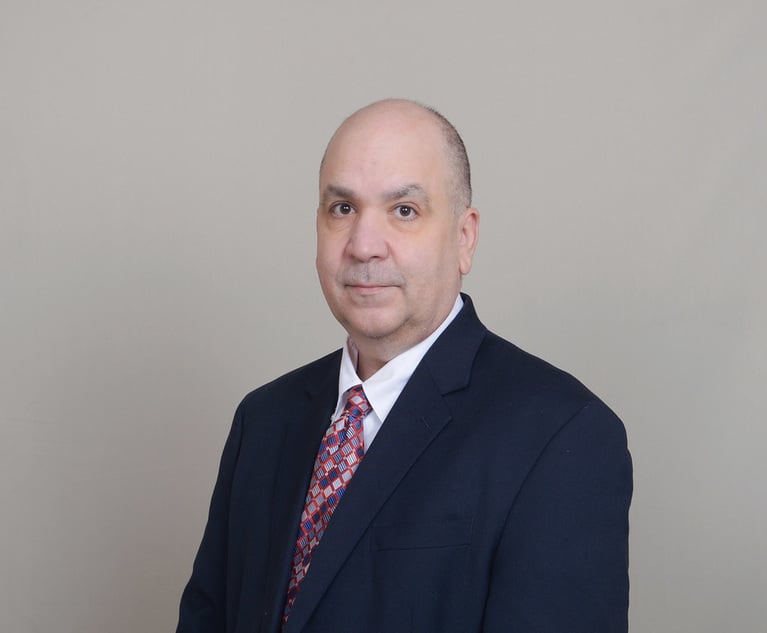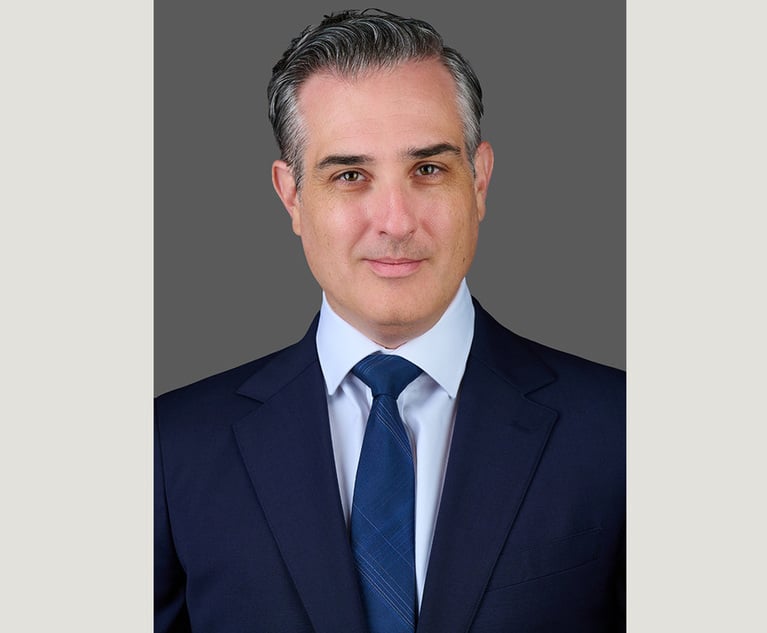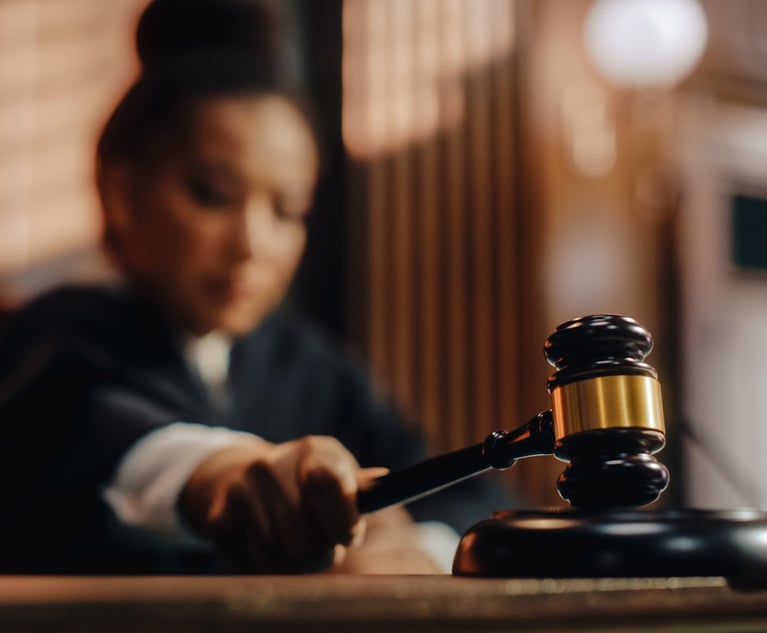 Photo: Jason Doiy
Photo: Jason DoiyJustices Punt on Whether Judge's Absence During Voir Dire Requires New Trial
In a concurring opinion, Justice Christine Donohue, joined by four other justices, expressed concern that judges are not required to be present for voir dire in civil cases the way they are in criminal cases.
April 23, 2020 at 03:15 PM
5 minute read
The Pennsylvania Supreme Court was poised to decide whether the Superior Court was required to defer to a trial judge's decision not to strike a juror in a medical malpractice case, despite the fact that the judge was absent from the room when the prospective jurors were questioned.
But the justices didn't get that far.
In an April 22 ruling in Trigg v. Children's Hospital of Pittsburgh of UPMC, the justices unanimously ruled that the issue was never properly preserved for appellate review and was therefore waived.
A three-judge Superior Court panel in May 2018 granted plaintiff Mendy Trigg a new trial and reversed an Allegheny County jury's verdict in favor of the Children's Hospital of Pittsburgh of UPMC after Trigg argued that the selected jurors were biased.
The issue centered on the absence of Allegheny County Court of Common Pleas Judge Ronald Folino during voir dire, and a lack of any firsthand observation of the jurors' demeanor during that process.
Trigg argued that the lack of judicial supervision allowed biased jurors to slip through the cracks, while the hospital maintained that the issue was a "red herring."
"The knowledge gleaned from in-person observations is 'impossible to place in the record, [but] must be considered,'" Judge Deborah Kunselman wrote in the Superior Court's opinion. "An absentee judge misses the crucial instant when would-be jurors reveal their inmost selves by both words and actions."
In January 2019, the Supreme Court agreed to hear argument on three issues:
"a. Whether the Superior Court's decision conflicted with the jurisprudence of this Honorable Court and other Superior Court decisions by failing to apply the 'palpable error' abuse of discretion standard of review and properly defer to the trial court?
b. Whether the Superior Court's holding directly conflicts with Shinal v. Toms, 162 A.3d 429 (Pa. 2017), which requires the denial of a strike for cause of a prospective juror when the prospective juror is willing and able to eliminate influences and render a verdict according to the evidence?
c. Whether the Superior Court improperly considered arguments regarding juror demeanor when those arguments were waived?"
But in the high court's April 22 opinion, Justice Debra Todd said that the plaintiffs, "in making their for-cause challenge to prospective juror 29, failed to raise with the trial judge any issue relating to his lack of observation of this juror's demeanor in answering voir dire questions, nor did they request that he personally interview the juror."
"As a result, the trial judge was deprived of any opportunity to address and resolve this issue before the jury was finally empaneled," said Todd, joined by Chief Justice Thomas Saylor and Justices Kevin Dougherty and Sallie Updyke Mundy. "Indeed, in his Rule 1925(a) opinion, the trial judge indicated his express willingness to conduct in-person interviews of prospective juror 29, had appellees asked that he do so, as it was his customary practice to grant such requests. However, appellees made no request for such individualized follow-up questioning, nor raised any claim that such an ameliorative measure would be inadequate to cure the alleged harm they now assert was caused by the trial court's absence during voir dire, even though the trial court left the question of the specific method it should use to address appellees' for-cause challenges entirely up to them."
Justice Christine Donohue, joined by Dougherty, Mundy and Justices David Wecht and Max Baer, wrote a concurring opinion, saying she "reluctantly" agreed that the plaintiffs waived their challenge.
Donohue said she saw no reason why a trial judge's presence during civil voir dire should not be required the way it is during criminal voir dire.
"Considering the great importance placed on the requirement for a fair and impartial jury, and the role of the trial judge in the seating of such juries, it cannot be contested that the empaneling of a jury is critical to assuring a fair and impartial jury," Donohue said. "Because the right to an impartial jury is guaranteed for both criminal and civil jury trials, a judge's role in voir dire is no less crucial in a civil case than in a criminal case."
Wecht, joined by Dougherty, penned his own concurring opinion, to agree with Donohue that recreating the questioning of juror 29 in the judge's chambers would not have been "the functional equivalent of the judge's presence during voir dire."
"Like Justice Donohue, I do not believe that calling the prospective juror in before the judge for a second round of questioning sufficed to replicate the opportunity for personal observation that the judge already missed," Wecht said.
Counsel for the Children's Hospital, Jason Zivkovic of Dickie, McCamey & Chilcote in Pittsburgh, could not be reached for comment.
Counsel for Trigg, Harry Cohen of Harry S. Cohen & Associates in Pittsburgh, also could not be reached.
This content has been archived. It is available through our partners, LexisNexis® and Bloomberg Law.
To view this content, please continue to their sites.
Not a Lexis Subscriber?
Subscribe Now
Not a Bloomberg Law Subscriber?
Subscribe Now
NOT FOR REPRINT
© 2025 ALM Global, LLC, All Rights Reserved. Request academic re-use from www.copyright.com. All other uses, submit a request to [email protected]. For more information visit Asset & Logo Licensing.
You Might Like
View All
People in the News—Jan. 9, 2025—Rawle & Henderson, Armstrong Teasdale
3 minute read


Phila. Court System Pushed to Adapt as Justices Greenlight Changes to Pa.'s Civil Jury Selection Rules
5 minute readLaw Firms Mentioned
Trending Stories
- 1'Merciless' Filing Deadline Dooms Cuban Americans' Property-Trafficking Suit Against BNP Paribas, SocGen
- 2In 2-1 Ruling, Court Clears Way for Decade-Old Wrongful Imprisonment Suit
- 3Trump Sentencing, TikTok Ban Welcome Justices Back to Work
- 4U.S. Eleventh Circuit Remands Helms-Burton Trafficking Case Involving Confiscated Cuban Port
- 5Can Passive Technology Change the Impaired Driving Trajectory?
Who Got The Work
Michael G. Bongiorno, Andrew Scott Dulberg and Elizabeth E. Driscoll from Wilmer Cutler Pickering Hale and Dorr have stepped in to represent Symbotic Inc., an A.I.-enabled technology platform that focuses on increasing supply chain efficiency, and other defendants in a pending shareholder derivative lawsuit. The case, filed Oct. 2 in Massachusetts District Court by the Brown Law Firm on behalf of Stephen Austen, accuses certain officers and directors of misleading investors in regard to Symbotic's potential for margin growth by failing to disclose that the company was not equipped to timely deploy its systems or manage expenses through project delays. The case, assigned to U.S. District Judge Nathaniel M. Gorton, is 1:24-cv-12522, Austen v. Cohen et al.
Who Got The Work
Edmund Polubinski and Marie Killmond of Davis Polk & Wardwell have entered appearances for data platform software development company MongoDB and other defendants in a pending shareholder derivative lawsuit. The action, filed Oct. 7 in New York Southern District Court by the Brown Law Firm, accuses the company's directors and/or officers of falsely expressing confidence in the company’s restructuring of its sales incentive plan and downplaying the severity of decreases in its upfront commitments. The case is 1:24-cv-07594, Roy v. Ittycheria et al.
Who Got The Work
Amy O. Bruchs and Kurt F. Ellison of Michael Best & Friedrich have entered appearances for Epic Systems Corp. in a pending employment discrimination lawsuit. The suit was filed Sept. 7 in Wisconsin Western District Court by Levine Eisberner LLC and Siri & Glimstad on behalf of a project manager who claims that he was wrongfully terminated after applying for a religious exemption to the defendant's COVID-19 vaccine mandate. The case, assigned to U.S. Magistrate Judge Anita Marie Boor, is 3:24-cv-00630, Secker, Nathan v. Epic Systems Corporation.
Who Got The Work
David X. Sullivan, Thomas J. Finn and Gregory A. Hall from McCarter & English have entered appearances for Sunrun Installation Services in a pending civil rights lawsuit. The complaint was filed Sept. 4 in Connecticut District Court by attorney Robert M. Berke on behalf of former employee George Edward Steins, who was arrested and charged with employing an unregistered home improvement salesperson. The complaint alleges that had Sunrun informed the Connecticut Department of Consumer Protection that the plaintiff's employment had ended in 2017 and that he no longer held Sunrun's home improvement contractor license, he would not have been hit with charges, which were dismissed in May 2024. The case, assigned to U.S. District Judge Jeffrey A. Meyer, is 3:24-cv-01423, Steins v. Sunrun, Inc. et al.
Who Got The Work
Greenberg Traurig shareholder Joshua L. Raskin has entered an appearance for boohoo.com UK Ltd. in a pending patent infringement lawsuit. The suit, filed Sept. 3 in Texas Eastern District Court by Rozier Hardt McDonough on behalf of Alto Dynamics, asserts five patents related to an online shopping platform. The case, assigned to U.S. District Judge Rodney Gilstrap, is 2:24-cv-00719, Alto Dynamics, LLC v. boohoo.com UK Limited.
Featured Firms
Law Offices of Gary Martin Hays & Associates, P.C.
(470) 294-1674
Law Offices of Mark E. Salomone
(857) 444-6468
Smith & Hassler
(713) 739-1250





